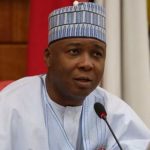
Despite kicking against the planned privatization of the water sector by the Amalgamated Union of Public Corporations, Civil Service, Technical and Recreational Services Employees (AUPCTRE), Civil Society Coalition for Good Governance (CSOs) and the Environmental Right Action (ERA), the Plateau State House of Assembly on Thursday passed into law the bill seeking to privatise the water sector in the state.
The bill was passed on Thursday following the report of the House Standing Committee on parastatals was considered at plenary.
Presenting the report, Hon. Godfrey Langdip, chairman of the committee, said the bill if passed into law would ensure adequate provision of the potable water to residents of the state.
Langdip added that the bill would enable rural dwellers access clean water with ease.
“Mr. Speaker, you will recall that this House at its plenary of March 28, committed this bill to this committee.
“Immediately we swung into action and called critical stakeholders for a public hearing on the bill.
“Sir, this bill has been subjected into deep scrutiny and we wish to call on this house to give it accelerated passage into law,” he said.
After a brief contribution from members on the bill, the Speaker of the Assembly, Rt. Hon. Joshua Madaki, announced the passage of the bill into law.
It would be recalled that on the 16 April, 2019, the Amalgamated Union of Public Corporations, Civil Service, Technical and Recreational Services Employees (AUPCTRE), Civil Society Coalition for Good Governance (CSOs) and the Environmental Right Action (ERA), had kicked against the plan.
Members of the aforementioned groups staged a peaceful protest and matched to the State House of Assembly carrying placards with different inscriptions to push home their demands.
According to article three sub-section one (P) of the bill seeks to promotes the Public Private Partnership (PPP) principles in the development and management of water resources in the state.
Speaking during the protest, National Deputy President of AUPCTRE, Abdullahi Ibrahim, described the move to privatise the sector as “anti masses”.
Ibrahim said the proposed water sector bill was a good move, but called for the removal of the aspect the calls for its commercialisation.
According to him, if government succeeds in privatising the sector, the poorest of the poor in the society would suffer gravely.
“The importance of water to human existence cannot be over-flogged, but water is important not only to man, but plants and animals as well.
“We drink water, use it for cooking, washing, growing our crops and industrial uses, and so we cannot afford to allow government use this critical sector for selfish gains.
“If this sector is left in the hands of private individuals, I tell you, the poor masses will be badly affected,” he said.
Comrade Steve Aluko, who spoke on behalf of CSOs, said privatising a critical like sector like the water sector would further throw the poor masses in the state into deep hardships.
According to the PPP model has over time proven to be a false solution as evidenced in some sector of the economy that has been privatised in the past.
“The bill is a right step in the right direction, but why we are kicking against the aspect of it that promote profit-driven system, because if allowed poor people will someday die of thirst.
“When you take a good look at the history of provitisation in Nigeria you don’t need anyone to tell you that this move is a wrong step.
“The Federal Road Safety Corps (FRSC) for instance, was doing well, until it became a profit-driven organisation, and it started derailing.
“So, we are saying no anytime to the plans by Plateau government to privatise the water sector in the state, ” .
Aluko said.
Aluko called on the State Assembly and the government to in the interest of Justice, fairness, equality sustainability and human right resist and reject the entrapments of PPP in the water sector and encourage high-quality, public-funded and democracally controlled water that would benefit all.
However, with the passage of the bill into law, the Assembly has paid deaf ears to the plea and concerns raised by the CSOs.





